MUCKRAKING, THE GOOD KIND
Many Meanings
“Muck” has some bad connotations. Among dictionaries’ definitions are such synonyms as “dirt,” “rubbish, or, worse, “slimy dirt or filth.” But that’s only part of the story. Especially across the Atlantic, muck is more aligned with “manure” or the diggings from soil especially rich in organic matter. (I once had, perhaps still have if I can find it, an older British gardening book all about muck.)
Muck, let’s use the Britishism, is really wonderful stuff. Plant roots revel in this fluffy material, and the result is dazzling flowers, luscious fruits, and cushiony, green lawns. I prefer the word “humus” to muck, but two people I questioned thought that humus (pronounced HEW-muss) was a Middle Eastern appetizer (which is hummus, pronounced HUH-miss). Another name for muck could be “soil organic matter” but seems too vapid for this dark, moist stuff that is seething with nutriment and life. Compost is a form of muck.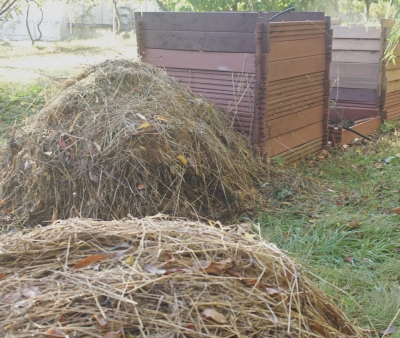
Leaves have fallen from trees and gardens are shutting down for the season, making now an especially good time of year for, er…mucking around. Dead tomato vines, old cabbage stalks, weeds, autumn leaves, perhaps even the last mowings from the lawn might make up the bulk of what you can gather. I supplement these materials with mowings from my small hayfield, a load of horse manure, and vegetable trimmings from the kitchen.
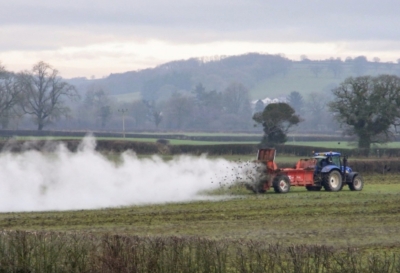
Manure spreading on farm
A friend of mine used to pick up scraps regularly saved for him at his favorite restaurant, and another friend carted pomace from a nearby winery over to his garden. The point is: There are many organic materials available, especially now, and they all can be transformed into muck or humus or whatever you want to call it. Anything that is or was living is suitable.
Making your soil more “mucky” is one of the few things you pretty much can’t overdo. No matter what type of soil you have, the more muck the better. Muck loosens up clay soils so they get more air, and helps sandy soils hold water. The stuff is home to microorganisms that kill plant pathogens, gobbling them up or poisoning them with natural exudates (antibiotics). Muck is a rich storehouse of nutrients and makes it easier for plants to gulp up certain nutrients that are already in the soil, but not in a form readily available.
Gathering together all these raw materials for making muck is good for the environment. In so doing, you ease the burden at the landfill, and you nourish your plants with food that, unlike synthetic fertilizers, does not consume petrochemicals in their manufacture. Muck releases its nutrients slowly into the soil and clings to nutrients that would otherwise leach, thus lessening the chance for groundwater pollution — also not the case with synthetic fertilizers.
Deal with It If you are now convinced that muck is good stuff, you may wonder what to do with all those piles of leaves and old plants once you have them. You could do nothing more than spread everything out on top of the ground in your vegetable and flower beds, and around the bases of trees and shrubs.
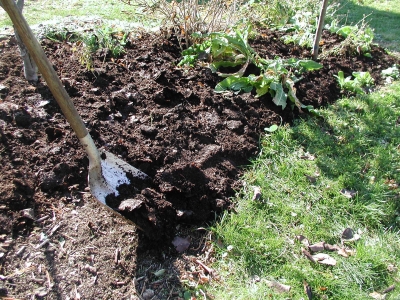
Spreading leaf mold
This fluffy layer is a good insulator, so will delay soil cooling this time of year, allowing more time for root growth — especially good for fall-planted trees and shrubs.
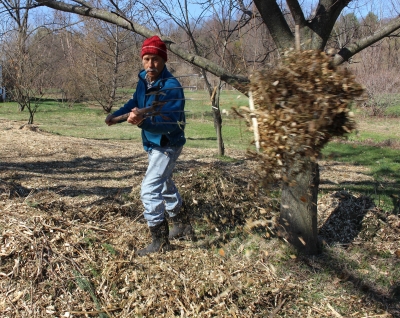
Mulching with wood chips
On the other hand, that mucky mulch delays warming of the soil in spring and, hence, spring planting of annual flowers and vegetables. Years ago, I dealt with this conundrum in my vegetable garden by removing all the leaves I had piled on the soil, stockpiling them until the soil warmed in late spring, then re-spreading them.
You don’t like the look of all that stuff lying on top of the ground, and you’re eager to plant annuals and vegetables in spring? Then dig all the materials into the soil, where almost all of it will decay, by spring, into dark, brown muck. No need to till the soil up finely; just leave it rough, and freezes and thaws in the coming months will start to break apart the large clods. Come spring, just tickle the surface with a rake to prepare your seedbed — a benign form of muckraking.
A third alternative — my choice for many years now — is to compost all this material. If you pile it into a bin, it will have a more elegant look than if you just pile it on top of the ground. 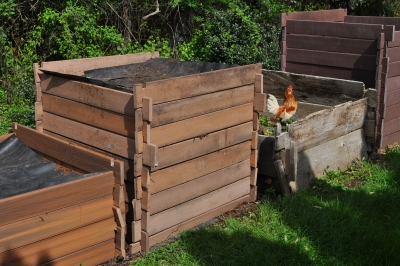 For fastest decomposition into muck, make sure the pile is well-aerated, moist, and contains a good balance of foods for microorganisms.
For fastest decomposition into muck, make sure the pile is well-aerated, moist, and contains a good balance of foods for microorganisms.

Compost piles, China, 1911
But don’t worry. Even if you don’t pay attention to any of these things, the material will still eventually decompose — albeit slower. But what’s the rush?
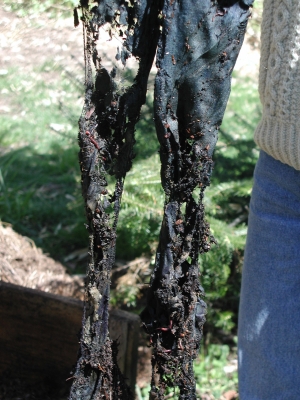
Old jeans on their way to muckdom
Over time, cultivated soils naturally lose organic matter as it decomposes to feed the soil and plants, so mucking around and muckraking should be part of your fall garden ritual every year. And after years of working with this material and watching plants respond, you will develop a sense of humus [sic].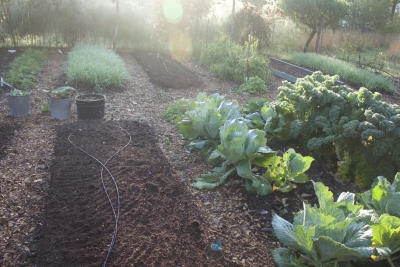


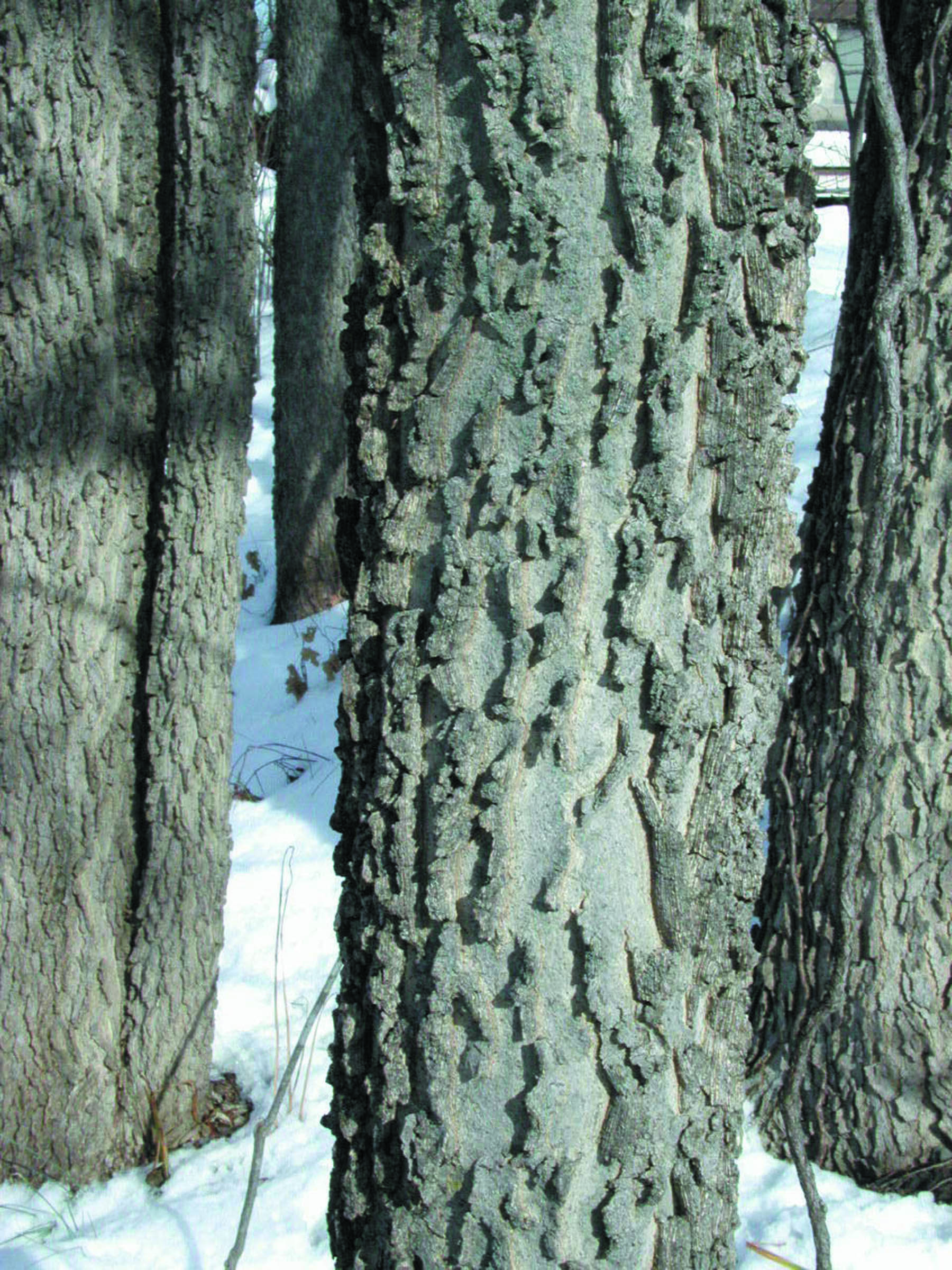
Love the mucky talk… especially your sense of humus!
Love the mucky talk… especially your sense of humus! Your writing style is epic!
(I blush)
Every other Friday, I turn my compost and encourage its coming “muckdom”.
Perhaps “muckdom” can become the word of the year for 2025.
I’m pretty sure it will be “muckdom” in 2025. Just not the good kind.
Hmmmm. “Muckdom” might be too weak a word in that case.
True that….
Lee, hi
So, I was damn fool this year when, in preparation of idle vegetable raw for the next year, I pulled out all the weeds and throw them away? I did add layer of a compost and slightly mixed it in.
BTW, I learned that practice, adding a compost, from you and finally, in the last summer, saw a tremendous improvement in my growing of tomatoes. There were many of them and of a significant size.
Thank you.
Hi Lee,
Your fourth picture in this article says “ Mulching with wood chips”. Do you add wood chips on top of the muck to prevent them blew away by high wind. I have chopped up fall leaves on my vegetable beds right now and I have to put small tree branches on top of the leaves to keep them in place. So I just brought some cedar mulch and hope it will help them to stay.
I never had a problem with excessive blowing. And once it rained, they kept in place even better. By the way, cedar is no better a much than any other wood. I prefer arborists wood chips of whatever trees they’ve been chipping.
Thanks Lee. I us bag mulch to save time and the cedar mulch is the most natural one that I could find.
Horsh is the best muck, pigs’ is no good it is too cold.
Pigs’ is also too smelly for me.